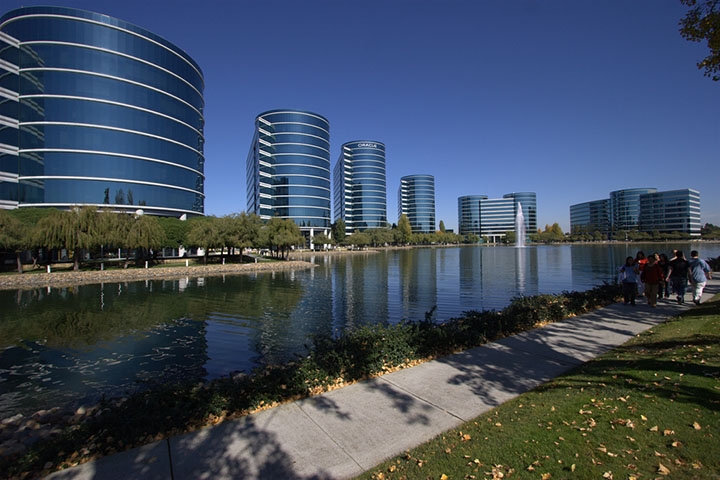Students at Design Tech High School moved into a brand-new, high-tech, 64,000-square-foot building on the campus of software giant Oracle this month—a school they helped design over the last three years.


Students at Design Tech High School moved into a brand-new, high-tech, 64,000-square-foot building on the campus of software giant Oracle this month—a school they helped design over the last three years.
When today’s seniors entered the public charter school, commonly referred to as d.tech, in 2014, the first class of 139 9th-graders plopped down in unused classrooms inside a traditional high school, according to The74Million.
In January, they walked into a state-of-the-art $43 million facility they helped bring to life.
“Even though they were just ninth-graders, they really participated confidently in design sessions, identifying needs, considering restraints,” d.tech Director of Learning Nicole Cerra told the education news site. “Their voices were big from the beginning, even if they didn’t get the zip line they wanted.”
The project stems from a public-private partnership between d.tech and Oracle, a multinational computer technology company in Redwood Shores, California. Oracle paid for the construction of the building, situated on 2.5 acres of unused land on its campus, that’s designed to inspire students to create and innovate, and to apply what they learn to their community.
Oracle also provides the school’s 550 students and 40 staff with unlimited access to the company’s expertise, The74Million reports.
In exchange, the software company helped to influence the curriculum at d.tech to create a culture of innovation.
“We are looking forward to our students having an easier and ongoing relationship with folks at Oracle to get that mentorship and guidance,” Cerra said. “There are a lot of great things about the location itself. The biggest advantage is getting to connect with [Oracle] volunteers.”
The arrangement works well because d.tech and Oracle share a vision of education that’s specifically centered on a drive to create. Students working with Oracle volunteers have already created real solutions, earned patents, and created products.
The74Million reports:
The heart of the new building—in an almost literal sense—is its two-story Design Realization Garage, a giant maker space. From a woodshop on the bottom floor to a digital lab on the top, Cerra says, the space was intentionally placed in the center of school to send a message that Design Tech centers on creation—fitting for a school that focuses on extreme personalization in learning and the use of design to solve problems.
“Learning is not just about receiving information or regurgitating information,” Cerra says. “It is really about creation. When kids practice with active creation, it encourages them to be problem solvers in the future. That real-world experience empowers them to start making that difference we want them to make already when they are in high school.”
Students focus on finding solutions during eight weeks of “intersessions” each school year. The sessions are led by leaders in the community—from small business and large companies, or nonprofits—that help push students to explore issues outside of the school.
“In every instance, the students are learning from real practitioners,” Oracle Education Foundation Executive Director Colleen Cassity told The74Million. “It is extraordinary the school is inviting the community into the education experience.”
The d.tech school is the latest in cutting-edge pedagogical schools centered on a clear and particular vision of learning that’s reflected in everything from the curriculum to the design of the school to the discipline to meet learning goals.
The Institute for Advanced Studies in Culture studied how pedagogical schools’ unique ethos bolsters character and citizenship formation.
David Sikkink, the Institute’s lead researcher of pedagogical schools, writes: “. . . these alternative schools often are attempts to realize a full-orbed vision of education that included a guiding mission or philosophy and fairly precise guidelines for school structure and teaching methods.”
That “full-orbed vision of education” at d.tech—centered on creation—is an inspiring thing.
“It is infectious for all of us,” Cassity said.
Pedagogical schools like d.tech provide fascinating case studies for how schools that have a “full-orbed vision of education” contribute to character formation—particularly as they involve students in responsible decision making. And d.tech is leading the way by involving students in every stage of school design and construction.
Sikkink contributed his research on the influence of pedagogical public and private schools—including Montessori, Waldorf, International Baccalaureate, Democratic, and New Tech schools—for a chapter in the new book The Content of Their Character, available for pre-order at a discount.
For further reading on CultureFeed